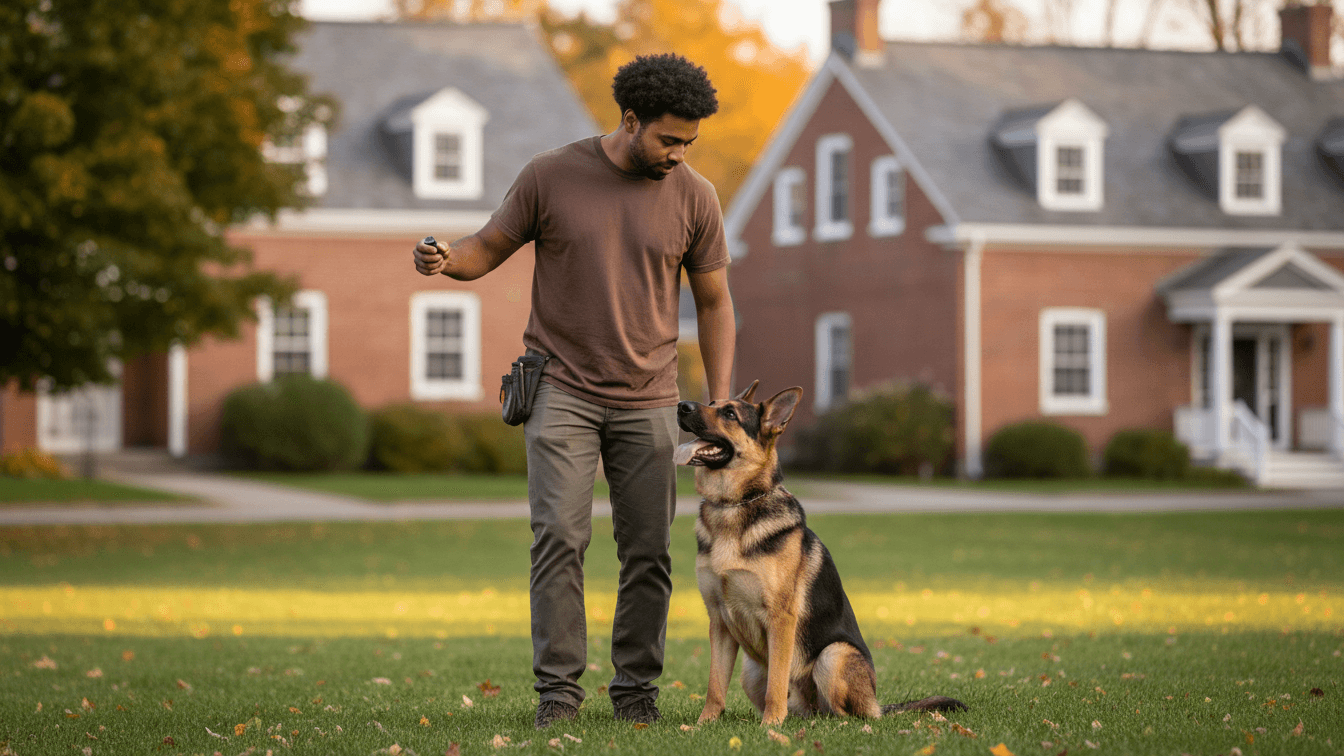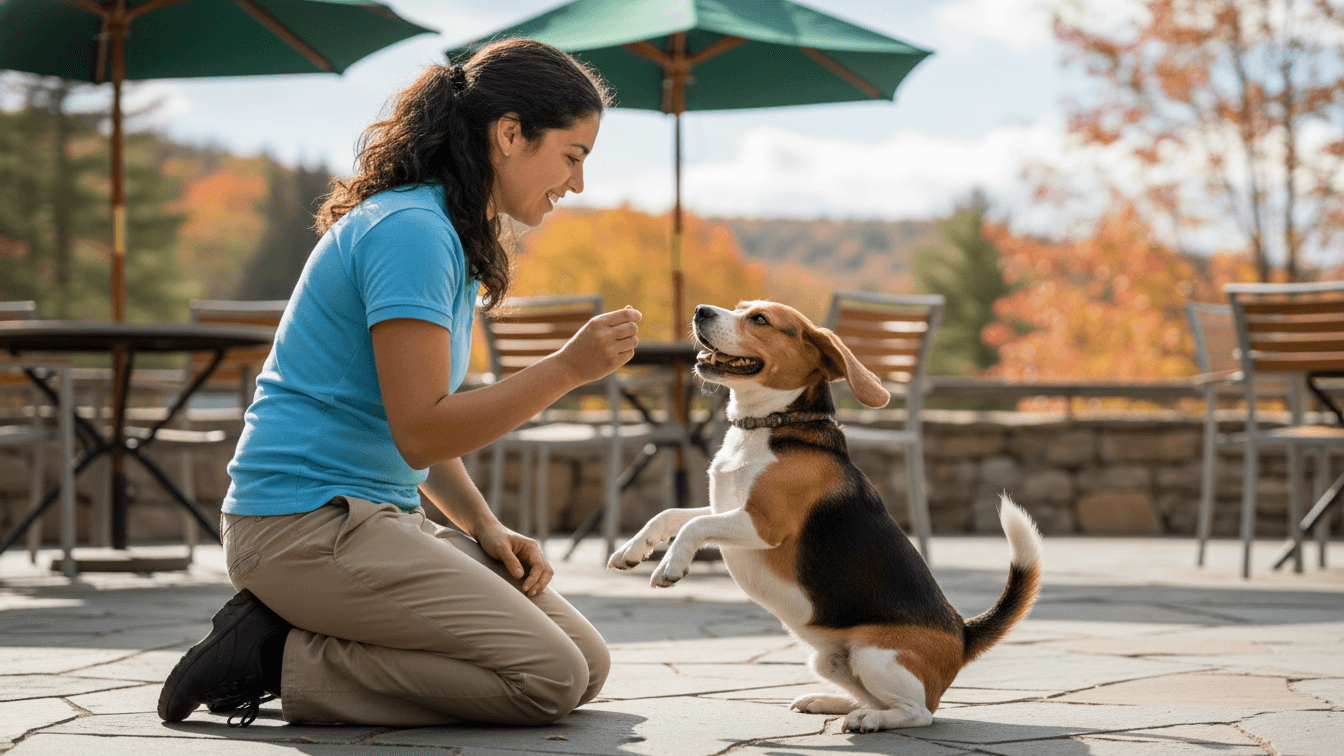Your Complete Guide to Choosing a Dog Trainer in Vermont and Surrounding Areas
Living with a dog in Vermont means navigating snowy winters, muddy springs, and the unique challenges of a rural state where wildlife encounters are common. Your dog needs to handle everything from polite greetings at farmers markets to calm behavior on forest trails where deer might appear at any moment.
Vermont doesn’t have breed-specific legislation at the state level, but each town can set its own rules about leash requirements and dog control. When you find a trainer who understands Vermont’s outdoor lifestyle and local regulations, you’ll get better results both at home and in the community.
How to Choose the Right Trainer
Start by looking for someone who uses positive reinforcement training and understands what it means to live with a dog in Vermont. This means your dog should learn to walk calmly past snowbanks without eating road salt, stay focused when encountering wildlife on trails, and handle the transition from outdoor adventures to indoor calm.
Credentials give you a quick way to compare trainers’ experience levels. Common dog trainer certifications include KPA-CTP, CPDT-KA, or IAABC-CDBC for behavior problems. If your dog has serious aggression or reactivity issues, look for someone with CBCC-KA or a science-based program.
In-home dog training works great for puppy training, door manners, and basic obedience skills you’ll use around your property. Group classes make sense once your dog can focus around other dogs, especially before visiting busier spots like Burlington’s waterfront or Stowe Village.
Common Dog Training Methods Explained

Reward-based methods build the trust you want while creating lasting behavior changes. They also help you follow local leash laws and keep your dog safe around Vermont’s abundant wildlife.
Basic obedience covers sit, down, stay, place, recall, and leash training so your dog can handle town greens, brewery patios, and trail parking areas without pulling or jumping on people. These skills matter even more when you’re managing your dog around bikes, skiers, or farm animals.
Puppy classes focus on socialization, potty training, bite control, crate comfort, and early leash skills. Starting with short, positive training sessions prevents bad habits from forming in the first place. Vermont puppies need extra work on house manners because of mud season and the long stretches of time spent indoors during winter.
Behavior modification addresses fear, reactivity, resource guarding, or separation anxiety through careful desensitization and counterconditioning. For serious cases, ask if your trainer works with local veterinarians who understand behavior issues.
Private lessons and in-home sessions let you customize everything around your daily routines, whether that’s managing your dog around backyard chickens or teaching calm greetings when guests arrive with snowy boots and gear.
Dog training classes help your dog practice good manners around other dogs and people. The best classes give dogs plenty of space, screen participants carefully, and teach calm behavior rather than just excitement.
Board and train programs can speed up results when you’re short on time, but make sure the facility follows humane methods and includes thorough handoff sessions so you can maintain the progress.
Specialized training like service dog training or therapy dog training requires extra structure, public-access skills, and a very clear step-by-step training program.
Stay away from trainers who use fear, intimidation, or pain to get results. Humane methods are safer for everyone, easier to maintain long-term, and much better for building a well-behaved dog who trusts you.
Average Cost of Dog Training in Vermont and Surrounding Areas (Updated for 2025)
Prices across Vermont depend on the trainer’s experience, how long sessions last, and where the training happens. Trainers in more populated areas like Chittenden County may charge slightly higher rates than those in rural counties.
| Service Type | Average Cost (Vermont) |
|---|---|
| Puppy classes (4-6 weeks) | $140-$250 total |
| Group obedience classes (4-6 weeks) | $150-$280 total |
| Private lessons (60-90 min) | $100-$175 per session |
| In-home coaching packages (4-6 visits) | $400-$850 total |
| Day training (trainer works your dog) | $425-$900 per week |
| Behavior consult for reactivity/anxiety | $140-$230 |
| Board and train (2-4 weeks) | $1,900-$4,200 total |
You’ll probably pay extra travel fees if you live in more remote areas of the state, and expect higher rates for complex behavior work or aggressive dog training.
Make sure you understand what’s included, how the trainer tracks progress, and whether they offer a free consultation or free evaluation before you sign up.
Questions to Ask a Potential Dog Trainer
- What training methods do you use, and how do you keep training sessions positive and low-stress?
- What credentials do you have, like KPA-CTP or CPDT-KA? Do you keep up with continuing education such as CPDT-KSA?
- How will you customize the training program for my dog’s specific needs and our Vermont lifestyle?
- Do you offer in-home visits, group classes, or day training, and which approach fits my goals best?
- How will we measure my dog’s progress and know when to add more distractions?
- What are the total costs, including any travel fees, and what’s your cancellation policy?
- Do you carry liability insurance, and can you show me proof?
- For behavior problems, will you work with my veterinarian if needed?
- What should I practice between our sessions to help my dog keep improving?
- How do you prepare dogs for Vermont-specific challenges like wildlife distractions and seasonal changes?
Local Vermont Rules and Considerations
Vermont enforces leash laws at the town level, and each municipality can set its own rules about dog control and nuisance violations. The state follows standard public health requirements for rabies vaccination.
Leash requirements vary by town, but most Vermont communities require dogs to be leashed or under voice control in public spaces. Some towns allow dogs to be at large on private property if they’re under the owner’s control, while others require leashes everywhere outside your own land. Check with your specific town clerk for local ordinances.
Vermont law requires current rabies vaccination for all dogs over four months old. You can get these through local veterinary clinics, and your dog must wear a valid rabies tag. Find more details through the Vermont Department of Health.
Excessive barking can be considered a nuisance in most Vermont towns, so work with your trainer on alert barking and separation anxiety before neighbors start complaining. Many towns have specific noise ordinances that apply to barking dogs.
Vermont doesn’t require special licenses for professional dog trainers, but if a business boards dogs for payment, they may need to follow regulations from the Vermont Agency of Agriculture. These rules ensure proper care, housing, and health standards for any animals kept at commercial facilities.
Dog liability falls under Vermont’s general premises liability laws. Owners are responsible for damage or injury their dogs cause, which makes having good control and a solid training foundation even more important.
Local Vermont Resources for Dog Owners
These spots give you great places to practice polite manners, work on recalls, and provide safe enrichment for your dog. Always follow the posted rules and etiquette guidelines.
- Starr Farm Dog Park in Burlington offers fenced areas for small and large dogs with clear rules posted. Practice recalls and calm greetings during quieter times of day.
- Montpelier Dog Park at the North Branch Nature Center provides a fenced area where dogs can play off-leash safely.
- Underhill Dog Park gives dogs space to run in a fenced setting with mountain views.
- Green Mountain Dog Club sponsors events and maintains resources for Vermont dog owners, though they focus on activities rather than training referrals.
- Local town recreation areas often allow leashed dogs on trails, giving you perfect opportunities to build focus around hikers, cyclists, and wildlife.

FAQs
How much does in-home dog training cost?
Most Vermont trainers charge $100-$175 per in-home visit, with discounts available when you buy packages. Behavior problems typically start at the higher end of that range, and you may pay additional travel fees if you live in a remote area.
Is in-home dog training worth it?
Absolutely, because you’re working on problems exactly where they happen. Your trainer can fix door manners, jumping on guests, counter-surfing, and yard reactivity right at home, then step outside to practice leash skills on your actual road or driveway where tractors, wildlife, or farm animals might appear.
Can you pay someone to house train your dog?
Yes, many trainers offer puppy programs that include potty training, crate routines, and daily schedules. Day training can speed up the process while teaching you how to maintain the progress. This matters even more during Vermont’s long winters when getting outside quickly is harder.
What is the 3-3-3 rule for dog training?
This is a helpful timeline for new or adopted dogs: expect about 3 days for your dog to decompress, 3 weeks to learn your routines, and 3 months to feel completely settled. Good training plans work with this natural adjustment period.
How long will it take to reach my training goals?
Most puppies and friendly adult dogs show solid progress within 4-8 weeks if you practice daily. Fear, reactivity, or aggression typically requires several months of careful behavior modification with gradual increases in difficulty. Vermont-specific challenges like wildlife encounters may need extra time.
What should I bring to group classes?
Pack a flat collar or harness, a 6-foot leash, high-value treats, water, and current vaccination records if your trainer requests them. Leave retractable leashes at home for safety reasons. In winter, bring towels to wipe muddy or snowy paws.
What’s the leash law in Vermont?
Leash laws vary by town across Vermont. Most communities require dogs to be leashed or under direct voice control in public spaces, but specific rules differ. Some towns allow dogs at large on private property with owner control, while others require leashes everywhere. Contact your town clerk for local ordinances.
Do I need a dog license in Vermont?
Yes, most Vermont towns require annual dog licenses. You’ll need proof of current rabies vaccination to get a license from your town clerk. Fees vary by town and whether your dog is spayed or neutered. Check with your specific municipality for requirements and costs.
What shots does my dog need in Vermont?
Vermont law requires rabies vaccination for all dogs over four months old. Your veterinarian may also recommend distemper-parvo, bordetella, leptospirosis, and Lyme disease vaccines based on your dog’s lifestyle and exposure risk. The Vermont Department of Health provides updated rabies requirements.
Are dog trainers required to be licensed in Vermont?
No special trainer licenses exist in Vermont. Certified dog trainers follow normal business regulations, but if they offer board and train services or keep multiple client dogs at their facility, they may need to meet state standards under the Vermont Agency of Agriculture regulations for commercial boarding facilities.
Where can I practice off-leash recall?
Use fenced dog parks in Burlington, Montpelier, or Underhill to keep things safe and legal. Try visiting during quieter hours when you’re starting out. Many Vermont towns don’t allow off-leash dogs in public parks or on trails, so private property or designated dog parks are your best options.
Which dog parks allow training around Vermont?
Starr Farm Dog Park in Burlington, Montpelier Dog Park at North Branch Nature Center, and Underhill Dog Park all allow off-leash play and training within their fenced areas. These spaces work well for practicing recall and socialization with other dogs.
What beaches or trails allow dogs for training?
Most Vermont state parks allow leashed dogs on trails but not on swimming beaches. Popular options include trails at Mount Philo State Park, Little River State Park, and Kingsland Bay State Park. The Long Trail and other Green Mountain hiking areas welcome leashed dogs, making them perfect for teaching calm focus around hikers and wildlife. Always check specific park rules before visiting.
What should I do if my dog encounters wildlife during training?
Vermont’s abundant wildlife means you’ll likely encounter deer, turkeys, moose, or even bears during outdoor training. Work with your trainer on a solid recall and impulse control before practicing in high-distraction environments. Keep your dog leashed in areas where wildlife is common, and never let your dog chase animals. Expert dog trainers in Vermont can help your dog learn to disengage from wildlife safely.
How do I find the right training for dogs with separation anxiety?
Separation anxiety requires careful behavior modification with a trainer experienced in this specific issue. Look for someone who uses gradual desensitization rather than flooding your dog with stress. A professional dog trainer with experience in anxiety issues can create a training program that helps your dog feel secure when left alone, which matters especially during Vermont’s long winters when dogs spend more time indoors.
The right combination of thoughtful planning, humane methods, and consistent practice around Vermont’s towns and trails will help your dog become a confident, well-behaved companion. If credentials matter to you, don’t hesitate to ask about dog trainer certifications and how your trainer stays current with new techniques. With patience and the right dog training services, you’ll have a top dog ready for any Vermont adventure.
